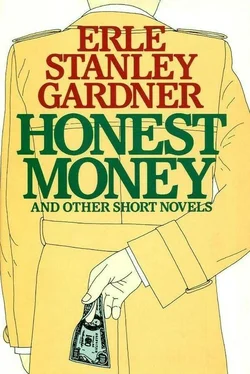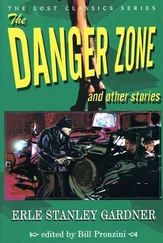“First, you tried to scare him by saying you’d let him get tried for the murder and then he scared you by telling you to go ahead and his lawyer would show up what happened. There was a lot of things, I guess, that had to be kinda shaded over. Things that you didn’t want the authorities looking into too much, about how long you’d been up there and how long Mrs. Bixel had been up there and how long her husband had been up there.
“So Harry Green got to bleeding you for money. You couldn’t stand it. You had an argument or a fight with him and shot him. But you knew where Sam Driver was, because Harry Green had told you where he was. Harry tried to make you think that Sam Driver could be a witness for him if you ever pinched him on the murder rap.
“Well, you had somebody that helped you and you put Harry’s body in Sam’s car and then you fixed the headlights so Sam would get pinched. You knew Sam was an ex convict and nobody’d believe him. But you did a slick stunt. You put lots of money in Harry’s pockets; then, if anybody did know the truth, it would look like Harry had been to your place and got the money and somebody had killed him afterwards. You figured either that Sam Driver would find the body and take out the money and try to beat it — as he did — or else, if he didn’t find the body until after he’d got pinched, the money would make it look like Harry Green had been to your place and gone away, in case anybody suspected what the truth was.”
Burman’s face was the color of bread dough, pasty and lifeless. He stared at her with glassy eyes and a mouth that sagged.
“You’re absolutely crazy,” he said, “you can’t prove a word of it!”
“Maybe not,” she said, “but, with what I know, and what Sam Driver knows we could come pretty near proving it. And I could prove that you and somebody else took Harry Green’s body and dumped it into Sam Driver’s car, because I seen you. I seen your Cadillac car and I know it. And I seen you. You had on evening clothes when you did it.”
Burman stood staring down at her with eyes that were cold and malevolent, lips that quivered.
“What do you want?” he asked.
“I want to know that you acted right,” she said. “If you did, I can shield you. But if you didn’t, I can’t.”
Burman spoke swiftly, persuasively.
“Look here,” he said, “some of your facts are right and some of them are wrong. Green didn’t tell you the whole truth. Green had broken into the place and tried to hold up Mrs. Bixel. I came into the room just in time and smashed Green over the head. It knocked him out and I put him in a closet.
“Then Bixel showed up and was going to shoot me. I had the gun that I’d taken from Harry Green and I shot first, that’s all. When Green regained consciousness, I put it up to him that he could either take five thousand dollars in cash and dust out, or that I’d turn him in for murder and frame it on him anyway. I was desperate and I had to do it. You can understand that. The killing was in self-defense, but I had another man’s wife with me and I’d killed her husband. A jury would have been hostile.”
Helen Vail’s voice maintained its tone of dreary weariness.
“You ain’t justified yourself yet. It ain’t right to have Sam Driver framed for this other murder. You had no right to kill Harry Green. You’re a rich man. You could have kept on paying him money and it wouldn’t have hurt you. You’ve got to let Sam Driver go free.”
“I can’t do that,” he said irritably. “I’ve fixed it up so he can get a break. He can take a plea for manslaughter.”
“Maybe the District Attorney wouldn’t agree to that,” said Helen Vail, in her assumed voice.
“Sure he will,” said Burman. “I can get anything I want. I am a political power here and I can fix things up. I’ve already got word to his lawyer. All you’ve got to do is to get out and stay out, and things will be all right.”
“Would Sam go to jail on that manslaughter charge?” asked Helen Vail in a slow, apathetic voice.
Burman cursed.
Helen Vail shook her head wearily.
“No,” she said, “I’ve had this on my conscience and I guess I’ve got to tell Sam Driver’s lawyer; it ain’t right not to.”
Burman’s hand dug deeper into the right-hand pocket of his coat,
“All right,” he said, “if that’s the way you feel about it, it’s your own fault. If you’d lived up to your bargain and done what you promised to do, you wouldn’t have got into this.”
“Into what?” she asked, looking up from her embroidering.
“Into this!” snapped Burman, and jerked an automatic from the pocket of his coat.
Helen Vail flung herself to one side with a stifled scream. The door from the kitchen exploded outward, and Ken Corning shot across the room in a low-flung football tackle. Burman wavered for an instant with indecision, and indecision was fatal. Ken Corning struck him with the force of a charging bull. Burman crashed to the floor.
The gun slipped from his fingers, skidded halfway across the room and slammed against the side of the wall. Corning felt the weight of the man rolling over on him, squirmed to free himself, heard a chair crash to the floor. His hands dug into the collar of the man’s coat. He was conscious of a tugging strain at his arms, then the coat fell in folds over his face. He kicked the garment from him, rolled to his hands and knees, and was in time to see Burman plunge through the door, into the night.
Ken Corning retrieved the gun and dropped it into the pocket of the coat Burman had left behind.
“Good work, kid,” he said.
Helen Vail stared at him with her eyes wide and round.
“What’ll he do now?” she asked.
“God knows,” he told her. “But the situation has got to come to a head now. He knows that we know. He was afraid the woman knew too much, so he used his influence to get her pinched on a liquor charge. She was peddling it, and he must have had detectives watching her. Once he had her in jail, it was easy to get her not to talk in return for squaring the liquor case.”
“How much did the woman really know?” asked Helen Vail.
“Perhaps not much,” Corning said slowly. “I put two and two together, and doped out what must have happened.”
Helen Vail was staring at the tip of her shoe, her face pensive.
“What’s the matter, kid?” asked Ken Corning. “Was it asking too much of you?”
“No,” she said, “I was thinking of that Mrs. Bixel and her laughing brown eyes. I hate to see her dragged through this.”
Ken Corning’s eyes narrowed.
“Let’s go up to Burman’s house,” he said slowly, “and see if we can reach some kind of an agreement.”
The roadster slid to the curb in front of Harrison Burman’s residence.
“You sit here,” Corning told Helen Vail.
Her lips clamped in a firm line, her face still smeared with the make-up, her hair covered with the wig, the girl shook her head determinedly.
“Nothing doing,” she said. “If he gets a chance, hell kill us both, to silence us.”
“Not now,” Corning told her. “‘Down there at the shack, when he lost his head, he would have killed you. He’s driven almost crazy. But he’ll show some sense now.”
“Just the same,” she told him, “I’m going in there with you, or you’re not going to go.”
He stood for a moment, staring at her.
He started to say something, but a woman’s scream knifed through the silence of the night.
“It came from the house,” said Helen Vail.
Her lips had scarcely finished with the last word, when a pistol shot sounded from the house.
Ken Corning started to run towards the front steps.
“Don’t!” screamed Helen Vail. “Don’t go in there until you know what’s happened! Keep out of it, chief, please.”
Читать дальше












